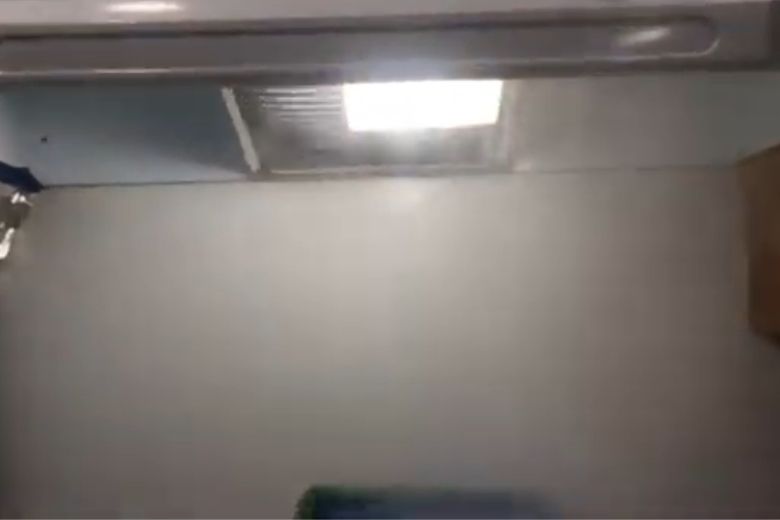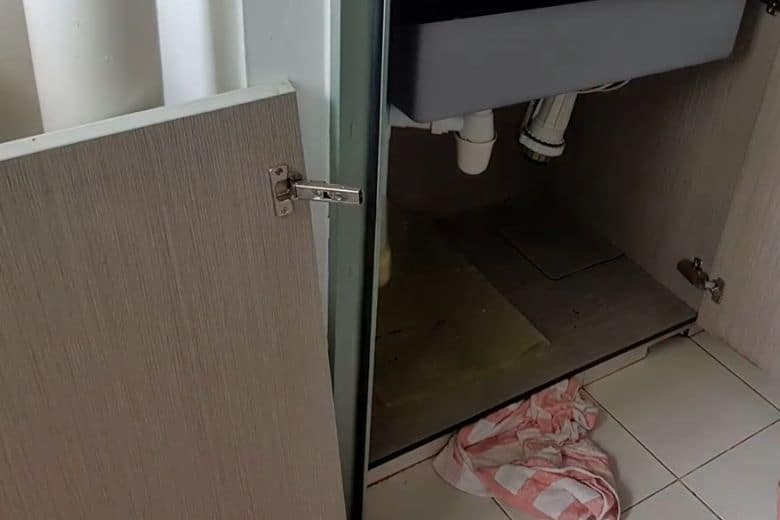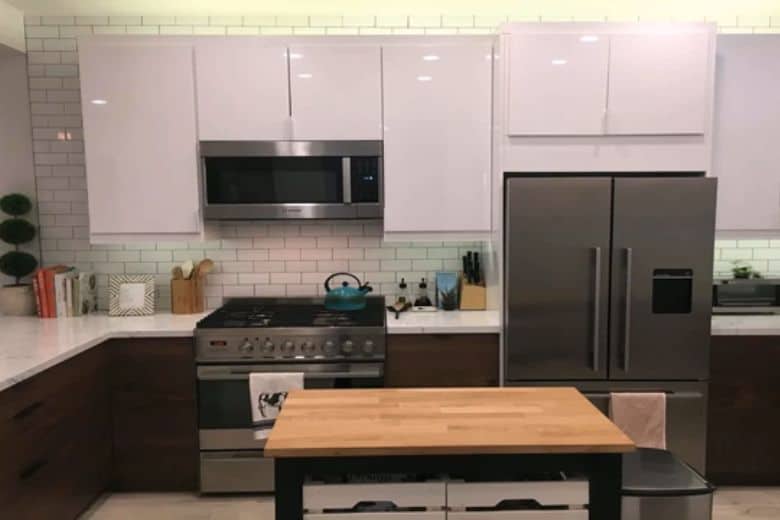A kitchen smoke detector that keeps going off is not only annoying even can be dangerous. Consequently, when it happens immediately, you need to understand the causes of this problem and find solutions to ensure safety.
But before exploring the reason, you should understand how kitchen smoke detectors work. So that you might know why it is happening.
Eventually, today we will discuss the leading causes of why your kitchen smoke detector keeps going off. And explore some practical solutions to resolve the issue.
Let’s have a look.
Understanding Kitchen Smoke Detectors
Before we jump into why your kitchen smoke detector keeps going off, you must understand how smoke detectors work.
However, Smoke detectors are designed to detect smoke in the air and trigger an alarm to alert you of a potential fire. They consist of a sensor that detects smoke particles. Therefore, a loud alarm that sounds when smoke is detected and a battery or power source that powers the unit.
Besides, it can also be triggered by other things that produce smoke or heat. For example, burnt toast or cooking food can cause the smoke detector to go off repeatedly. Needless to say, it is disruptive and puzzling.
Why Does the Kitchen Smoke Detector Keep Going Off?
After knowing the function of a smoke detector, you might understand sometimes a kitchen smoke detector keeps going off due to its mechanical system rather than other serious reason. And when without fire, the smoke detector goes off repeatedly. It’s called a false smoke alarm.
Here we have included a few common causes of false alarms in the kitchen smoke detector.
1. Cooking Activities
The most common reason for false alarms in the kitchen is cooking. As you know, smoke detectors produce a warning alarm when they find smoke in the air. Meanwhile, it often happens when you are cooking. The smoke, steam and other particles are released into the air, producing smoke and eventually pushing the smoke detector to go off.
It happens especially when cooking at high temperatures, frying, grilling, or even boiling water. And the smoke detector is located too near the cooking area.
Besides toasters, ovens can trigger smoke detectors if they become old or dirty. Crumbs and other debris can accumulate over time, causing smoke to be released when you use them.
Once more, burnt food also sometimes produces smoke. No wonder the smoke detector often mistakes it for a fire. It is generally true for food that is burnt or charred. Since steam can condense on the sensor, making it think there’s smoke.
Because smoke detectors are susceptible, smoke from cooking can quickly spread to other areas of the house, causing the smoke detector to go off.
2. Battery Issues
Another reason your kitchen smoke detector may keep going off is due to battery issues. Battery issues can vary in the sense of a few circumstances. Let’s find out the most common battery issue of kitchen smoke detectors.
- Low battery: A low battery is the primary reason for a smoke detector to beep or chirp continuously. If your smoke detector runs on low battery, it may give false alarms or false positives. Because when the battery is low, the sensor may not function correctly, causing it to trigger the alarm. Meanwhile, it is pushed to go off unexpectedly even when no smoke or fire exists.
- Battery corrosion: Corrosion is another common problem that causes your smoke detector to malfunction. After prolonged use, the batteries in your smoke detector can leak and corrode, causing damage to the battery contacts. As a result, this corrosion often causes the smoke detector to malfunction, leading to false alarms.
- Dead battery: Another reason for false alarms is a dead battery. Yes, if your smoke detector battery is over, your detector can not work at all. Consequently, it began to perform incorrectly and went off without any notice.
- Incorrect battery type: Using the wrong kind of battery can also cause your smoke detector to malfunction.
3. Dust and Debris
Smoke detectors are sensitive devices and are easily hampered by dust and debris. Generally, it happens when your smoke detector is dirty with dust and debris and needs to clean. In that case, dust and debris can accumulate inside it and cause it to go off. Regular cleaning of your smoke detector can help prevent this issue.
4. Malfunctioning Smoke Detector
If none of the above reasons is the cause of the problem, it may be due to a malfunctioning smoke detector. Smoke detectors have a limited lifespan and may malfunction over time. Being sure that it’s using time helps you identify whether the smoke detector has expired or not.
5. Steam from Showers and Baths
Steam from showers and baths can also sometimes cause smoke detectors to produce false alarms or go off, especially if your kitchen smoke detector is placed very near the bathroom. The steam can trigger the sensor and cause the alarm to go off.
6. Dirty smoke Detector:
A dirty smoke detector can cause false alarms and suddenly go off. Dust, cobwebs, or other debris can accumulate on the sensor, causing this issue.
7. Sensor Malfunction:
Sometimes, smoke detectors can malfunction, causing them to go off even when there’s no smoke or fire. It can be due to a faulty sensor or wiring issue.
Importance of Having a Functioning Smoke Detector:
A functioning smoke detector is crucial because it can save your life in a fire outbreak. Smoke detectors are designed to detect smoke and alert you in case of a fire, allowing you to take the necessary steps to put out the fire or evacuate the building.
With a functioning smoke detector, you may be alerted to a fire once it’s too late, putting you and your family at risk. Therefore, you must ensure that your smoke detector is working correctly and not being triggered unnecessarily.
Solutions for a Kitchen Smoke Detector That Keeps Going Off
Initially, we have assured you provide the solution for this unwanted problem. Here we have included a few solutions. Have a look at which one meets your need.
1. Move the Smoke Detector Location
The first solution for a kitchen smoke detector that keeps going off is to move the device to another place. This solution will help if your smoke detector keeps going off for your cooking activities. Find a location where the cooking stream and smoke are not going directly.
Installing a smoke detector in a different location in the same room can help prevent false alarms caused by cooking activities.
2. Clean the Smoke Detector
Secondly, regularly cleaning your smoke detector can help prevent false alarms caused by dust and debris. Use a soft brush or a vacuum cleaner to remove any dust or debris from the device. Be sure to follow the manufacturer’s instructions when cleaning your smoke detector.
3. Replace the Battery
We already mentioned in the previous section how many battery issues can occur and how they impact your smoke detector.
So, if the battery in your smoke detector is low, dead, or incorrect, replace it immediately. It can help prevent false alarms and ensure your smoke detector works properly.
Moreover, replacing the batteries once a year keeps your device updated and ensures the sensor’s correct functionality.
4. Ensure Proper Placement and Ventilation
Proper placement of your smoke detector can significantly reduce false alarms. Smoke detectors should be installed at least ten feet from the stove to avoid triggering the alarm while cooking.
Besides, ventilation in your kitchen can also reduce false alarms. Moreover, use your range hood or open a window to vent steam and smoke out of the kitchen.
5. Regular Cleaning of Another Appliance
Regular cleaning of your kitchen appliances, such as ovens and toasters, also helps to prevent false alarms. Remove any crumbs and debris that may have accumulated over time.
6. Replace the Smoke Detector
If none of the above solutions works, it may be time to replace your smoke detector. Smoke detectors have a limited lifespan; if your smoke detector is over ten years old, it may be time to replace it with a new one.
Cooking Tips to Prevent False Alarms:
1. Keep the kitchen well-ventilated: Proper ventilation is essential when cooking. Open windows or turn on the exhaust fan to keep the air flowing and prevent smoke from accumulating.
2. Use the correct cooking temperature: Cooking at a high temperature can cause smoke, so using the right temperature for the food you cook is significant.
3. Avoid using too much oil: Using too much oil can cause it to splatter and produce smoke. Use the appropriate amount of oil for the recipe and avoid overheating the oil.
4. Keep the stovetop clean: Food and oil buildup on the stovetop can produce smoke, so it’s essential to keep it clean. Wipe down the stovetop regularly and clean up any spills or messes immediately.
5. Use lids while cooking: Using lids while cooking can help prevent smoke from escaping and setting off the smoke detector. It is beneficial when cooking with oil or frying food.
Maintenance Tips for Smoke Detectors:
- Smoke detectors can accumulate dust and debris, interfering with their function. So try to clean your smoke detector regularly by gently vacuuming or wiping it with a soft cloth.
- Smoke detectors run on batteries, so replacing them before the battery dead is essential. Replacing the batteries at least once a year or when low-battery warning sounds occur.
- Testing your smoke detector regularly will be beneficial to ensure it functions correctly. You can test it by pressing the test button on the detector, which should sound the alarm. If the alarm doesn’t sound, replace the batteries or contact a professional to check the sensor.
- Smoke detectors have a lifespan of around ten years and should be replaced after that time. If your detector has been in use for over a decade, replacing it with a new one is recommended.
Frequently Asked Questions
How often should I replace the batteries in my smoke detector?
Answer: You should replace your smoke detector batteries within six months or at least once a year.
Can I disable my smoke detector while cooking to prevent false alarms?
Answer: No, disabling your smoke detector while cooking is not a good idea. It could put you and your family in danger in case of fire.
How often should I test my smoke detector?
Answer: You should try to test your smoke detector at least once a month to ensure that it is functioning properly.
How do I know if my smoke detector is working correctly?
Answer: You can test your smoke detector by pressing the test button on the device. If the alarm sounds, then it is functioning correctly. Additionally, if the smoke detector is chirping or beeping. It may indicate a low battery or malfunction and should be addressed immediately.
Do I need a smoke detector in every room of my house?
Answer: It is recommended to have a smoke detector on every level of your home, including inside and outside of sleeping areas. It is also recommended to have a smoke detector in every bedroom and common areas, such as the living room or kitchen.
Conclusion
However, having a working kitchen exhaust fan and smoke detector in the kitchen is essential for the safety of occupants and the property. If your kitchen smoke detector keeps going off, find the reason immediately. Therefore, following our guidelines, try to solve the issue and ensure a safe living environment.
But if after trying all solutions, the problem consists, and your smoke detector is still under warranty. Then immediately contact the manufacturer. Stay safe and be vigilant!
Paul Newman is a blogger who writes about plumbing and home improvement. Over the past 20 years, I have worked as a plumber. My passion is to share my knowledge and experience with others to improve their homes.




